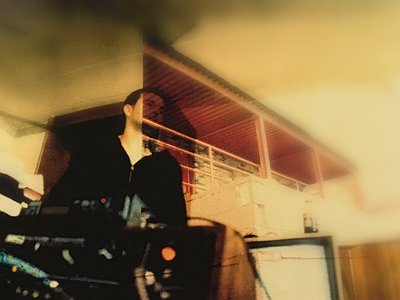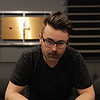Part 2
Could you describe your creative process on the basis of a piece or album that's particularly dear to you, please? Where did the ideas come from, how were they transformed in your mind, what did you start with and how do you refine these beginnings into the finished work of art?
I really enjoyed working on my latest EP on Mosaic Records. This record was going to mark my re-entry into the music scene after a fifteen-year hiatus, so from the beginning, I knew it was going to hold a special place in my heart. Before starting the project, I spent a lot of time considering how I would produce a record that made present the events of the past made a new (in a mature and deliberate nature). I surrounded myself with inspiring artwork while I built up my pallet of sounds and effect chains that I would use for the project. I started with specific ideas and built upon them until I was ready to create the arrangement by stripping away elements to reveal the final structure. Lastly, I went through a cycle consisting of mixdown, critical listening, tweaking until I was satisfied with the results.
There are many descriptions of the ideal state of mind for being creative. What is it like for you? What supports this ideal state of mind and what are distractions? Are there strategies to enter into this state more easily?
I need to have a low anxiety level to be creative. My family needs and other responsibilities have to be taken care of before I can begin to get into a creative mindset. Having other obligations looming over my head will be stifling. For years I didn’t know how to balance this relationship, so I completely gave up on making music. I didn't think it was possible to balance everything. Now that I’m older (and a little wiser), I realize that if I set clear priorities and keep a healthy perspective on things I can do both.
How is playing live and writing music in the studio connected? What do you achieve and draw from each experience personally? How do you see the relationship between improvisation and composition in this regard?
I'm currently asking myself that very question. I haven’t played live in a long time (Deepchord DEMF performance in 2001). Since my return to music, I have been thinking about what a future live show will consist of. How the relationship between improv and composition plays out is still an unknown to me at this point, but I'm excited to see how I might be able to draw from one to feed the other.
How do you see the relationship between the 'sound' aspects of music and the 'composition' aspects? How do you work with sound and timbre to meet certain production ideas and in which way can certain sounds already take on compositional qualities?
You could say that some sounds and effects can have a compositional quality in themselves at a macro level. Sometimes this contributes to the formation of a track. For example, when I’m working with a sound source with multiple effects on it, I listen for subtle characteristics that speak to me. Sometimes I will exaggerate these qualities or compliment them with other assortments. As far a timbre selection goes, I usually select something that is near what I originally envisioned for a track, but I don't get worried if it's not perfect from the start. I will go back and make the more critical selections if I feel that the track warrants the investment and is worth pursuing further.
Our sense of hearing shares intriguing connections to other senses. From your experience, what are some of the most inspiring overlaps between different senses - and what do they tell us about the way our senses work? What happens to sound at its outermost borders?
The other day, I was at a family gathering where the sense of taste and the sound of a family member's voice instantly took me back 20 years, and I recalled memories and emotions as if they were happening at that very moment. When we have an experience that utilizes multiple senses, it becomes even more memorable. It’s almost burnt into the PRAM of our brains. My music is often influenced by other forms of art, so when I have a visual to accompany my work, it becomes much more intense, meaningful, and satisfying. When I gaze at a piece while listening to music, the sound becomes another sensory element within my environment. Having the music in soft focus frees my mind to wander, and I’m invited to become more involved.
Art can be a purpose in its own right, but it can also directly feed back into everyday life, take on a social and political role and lead to more engagement. Can you describe your approach to art and being an artist?
Like many musicians and artists, I've always had a deep sense and need to create. I tried to suppress it for many years, but the desire was so supernatural that I couldn't resist. Today, I'm not out to make a statement with my work. I just want to create something beautiful that others will find inspiring. I recently received a message from someone that spent a difficult period in the hospital, and they said that my music was instrumental in helping them through that trying time. I was very overwhelmed to know that my work could have such an influence on them. I think this is an example of art's highest calling and illustrates how powerful of an effect it can have on both the creator and the receiver.
It is remarkable, in a way, that we have arrived in the 21 st century with the basic concept of music still intact. Do you have a vision of music, an idea of what music could be beyond its current form?
I see a future where AI software will algorithmically create one of a kind songs for the individual listener. Computer algorithm programmers and software engineers will become wealthy Rock Stars. You’ll hear people talk about the latest algorithm from so and so and how brilliant the AI generated songs are from specific engineers. Instead of music files on your iPod, you'll just have a bunch of algorithms you load into genre apps.






